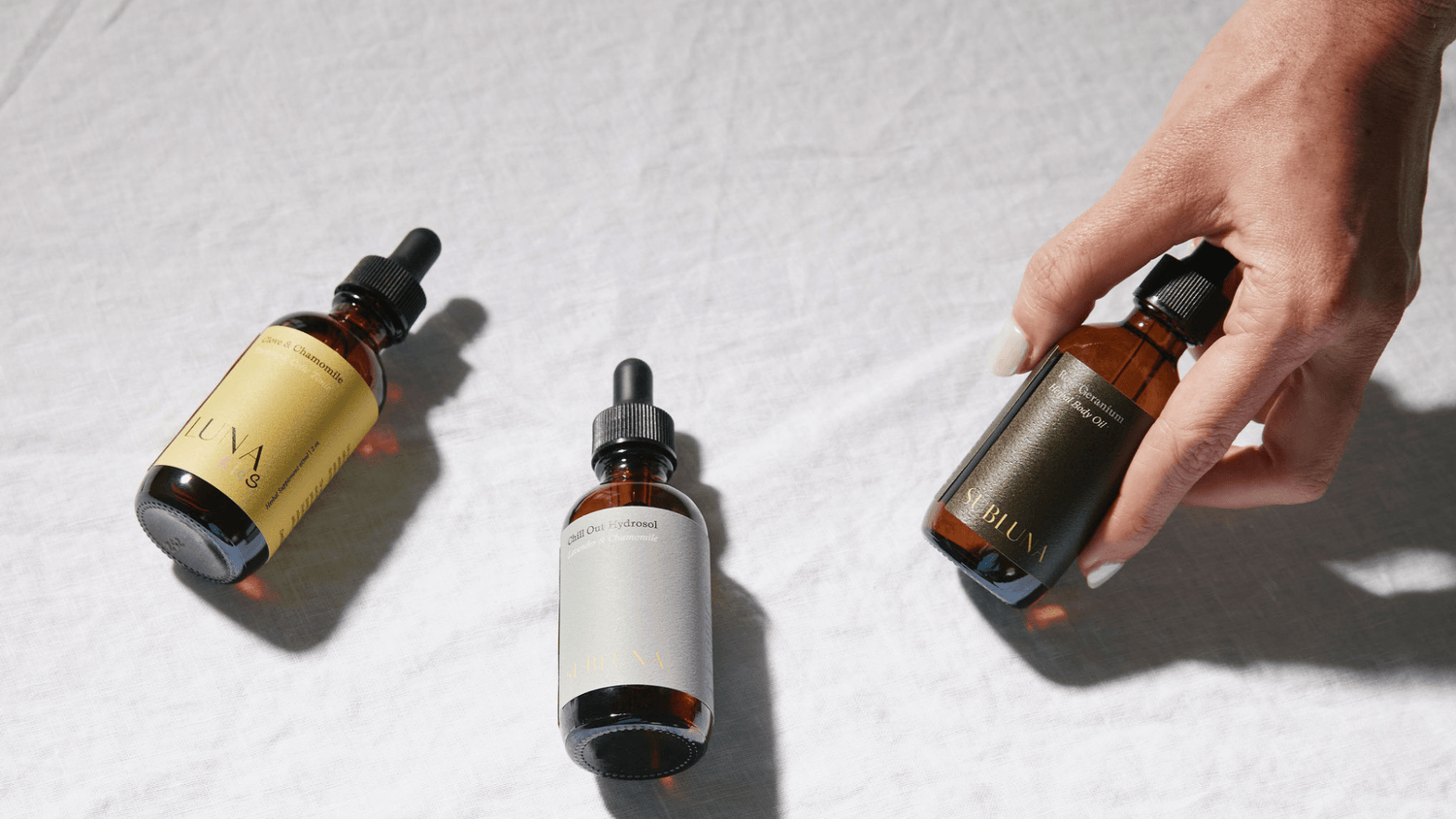Using Herbs During Pregnancy and Breastfeeding
Our Philosophy on Using Herbs During Pregnancy and Breastfeeding: Embracing Autonomy
At SubLuna, we approach the use of herbs during pregnancy and breastfeeding through a lens of autonomy and deep respect for a woman’s intuition and knowledge of her own body. Every day, we see fear-mongering around the use of herbs for pregnant and breastfeeding women, whether it comes from medical providers or even seasoned herbalists. This fear, in our view, is yet another way that pregnant and breastfeeding women are “othered” in our culture, often being told what they can and cannot do with their bodies.
At the foundation of SubLuna, we believe that pregnant women and mothers have full autonomy over what they choose to put into their bodies and how they choose to mother their children. You know your body best. We encourage you to challenge the status quo that encourages outsourcing your autonomy to professionals who don't know your body as well as you do.
The Limitations of Research on Pregnant and Breastfeeding Women
One of the critical factors to consider while pregnant or breastfeeding is the inherent limitations in scientific research involving these stages of life. It is considered unethical to conduct any form of testing on pregnant or breastfeeding women. Because of this, no herb will ever be unanimously deemed "safe" for use during pregnancy or breastfeeding in a formal setting. This doesn't mean that herbs are unsafe; it simply means the research doesn't exist to label them as such. Because of this, in an allopathic setting, herbs are viewed as harmful until they are proven safe, a stance that starkly contrasts with how pharmaceuticals are treated. Pharmaceuticals are often assumed to be safe until they are proven harmful, a double standard that has, in many cases, led to detrimental outcomes for both women and their fetuses. A well-known example is the case of thalidomide, a drug prescribed for morning sickness in the 1950s and 1960s that resulted in severe birth defects before it was recognized as harmful.
The absence of formal studies on the safety of herbs during pregnancy and breastfeeding shouldn't automatically lead to fear. Instead, it should prompt a deeper understanding of the body's natural processes and the nuanced effects of herbs. When pairing this with an understanding of your own body, you can do your own risk-benefit assessment when it comes to how you interact with herbs during pregnancy and breastfeeding.
Can Herbs Terminate a Pregnancy?
It's important to address a common concern: the fear that herbs could accidentally terminate a pregnancy. This is simply not the case. Herbs that have been historically used to terminate a pregnancy, known as abortifacients, require specific combinations of herbs in large, frequent doses during a very specific time frame in the pregnancy, just a few weeks within the very early stages of pregnancy. Even then, these herbs do not always work. The notion that consuming a common herb in a standard dose could unintentionally terminate a pregnancy is a misconception that needs to be dispelled.
It's essential to understand that just because an herb could potentially cause an issue in a formula in large, frequent doses, that doesn’t mean it will in smaller, less frequent doses over a short period. Nuance is everything here.
Powerful Women Trust in Their Bodies
As women, our biological purpose is to create and sustain life. The survival of our species depends on that, and if pregnant bodies were as fragile and vulnerable as some might suggest, the human population simply would not have survived. The idea that life could be easily "snuffed out" by taking a couple of doses of an herb underestimates the incredible resilience and strength of the female body.
At SubLuna, our stance on herbal use during pregnancy is one of relaxed autonomy.
Personally, there are only one or two herbs that we warrant as a possibility to avoid during pregnancy or while nursing a small baby, and those are strong antiparasitic herbs such as black walnut and wormwood. However, even with those, we recognize that every woman’s body and risk assessment is different. We hear from women who have used these herbs during pregnancy without issue—it was their choice, and they made it with confidence.
Of course, this is a sensitive topic, especially for those who have experienced miscarriage or loss. If you were told that a cup of hibiscus tea or another herb you consumed caused a miscarriage, we want to express our deepest sympathy. It’s impossible to know exactly what happened, and it’s unfair for someone to tell you otherwise. We can only share that the body naturally prioritizes the health of both the baby and the mother, and many herbs that are often blamed for complications during pregnancy are used without consequence in other parts of the world.
Considerations for Breastfeeding Mothers
When it comes to breastfeeding, the main concern is whether or not an herb can cause milk supply to dry up. Herbs like sage are known for their drying energetics and can even be used in high doses to help a mother intentionally dry up her milk.
However, if a nursing relationship with an adequate supply has already been established, some mothers may feel comfortable and confident working with these herbs while simply monitoring their supply, especially if it’s just for a few days when they have an acute issue. While monitoring, if they notice a drop in supply, it can often be easily recovered by simply stopping the herb.
On the other hand, mothers who struggle with maintaining their milk supply and have to work hard for every drop may decide that it’s not worth the risk. These mothers might choose to avoid herbs with strong drying properties altogether to ensure that their milk supply remains stable.
Another factor to consider is that some herbal constituents may pass to your baby via breast milk. While there isn’t a lot of research in this area, it’s important to note that the medicinal doses of herbs typically used aren’t very high, and the transfer to breast milk is generally negligible.
Herbal medicine is usually dosed in small, frequent amounts to maintain its presence in the body. High doses of herbs, which might lead to a more measurable transfer through breast milk, are uncommon.
Therefore, in small, frequent doses, you’re unlikely to experience significant transfer.
In the studies that have demonstrated some transfer, it was often more concentrated doses of isolated constituents being used—like berberine, which is found in goldenseal—rather than the whole plant.
On the other hand, some herbs, like fennel, have been shown to have positive effects on babies. For instance, when a mother takes fennel, it can help relieve symptoms of gas and colic in her baby due to its passage through the milk.
Many mothers may choose to use the potential of milk transfer to their advantage by dosing with herbs they believe will benefit their baby, regardless of whether the research explicitly shows that those constituents transfer. This is another way mothers can use their knowledge and intuition to make informed decisions about their health and their baby's well-being.
How to Research Herbs When Pregnant or Breastfeeding
When considering the use of herbs during pregnancy or breastfeeding, it's crucial to approach your research thoughtfully and thoroughly. At SubLuna, we recommend focusing on three key pillars to determine whether or not an herb is right for you:
-
Cultural and Traditional Uses: Past and Present
One of the most valuable ways to understand an herb's potential effects during pregnancy or breastfeeding is to research how it has been used in other cultures and paths of herbalism, both past and present. Many herbs that are considered "unsafe" in modern Western herbalism or allopathic medicine have a long history of use during pregnancy in other countries, indigenous cultures, Ayurvedic tradition, Traditional Chinese Medicine (TCM), and more.
For example, the herb Rue (Ruta graveolens) is labeled as an abortifacient in Western herbalism and is considered absolutely unsafe for pregnancy at all costs. However, this perspective is not universal. In Ethiopia, women traditionally enjoy rue in their coffee daily throughout their pregnancies without fear. This stark difference highlights the importance of understanding cultural context and the various ways herbs are used around the world.
By exploring how other cultures and traditions approach herbal medicine, especially in the context of pregnancy and breastfeeding, you can gain a broader understanding of an herb's potential and make more informed decisions that resonate with your unique perspective and needs. -
Familiarize Yourself with Herbal Actions and Energetics
It's essential to familiarize yourself with the herbal actions and energetics of any herb you are considering, especially during pregnancy and breastfeeding. Understanding how an herb interacts with the body will allow you to pay close attention to how it affects you personally. Body literacy—the deep understanding of your body's signals, needs, and responses—is key when working with herbs and is crucial in all aspects of pregnancy and being a new mother.
For example, pregnant women may want to learn about the herbal category of emmenagogues, meaning that it can cause contractions or bring on a late period. Yes, emmenagogues can be used to cause contractions in the body, but so can mild exercise or having an orgasm, both of which are considered beneficial in pregnancy! Just like how some women choose to exercise during pregnancy and stop when they feel uncomfortable, the same logic can be applied to herbs.
By understanding the actions of an herb, you know when and how to monitor its effects on your body and make adjustments as needed. This keeps the power of what you do with your body firmly in your hands. -
Google Like an Herbalist
When researching an herb to use during pregnancy, it's essential to go beyond just typing "herb + pregnancy" into a search engine. Instead, search for "herb + herbal monograph." Herbal monographs are comprehensive documents that detail everything about a particular herb, including its properties, uses, and its potential contraindications. The contraindications section will explain if and why an herb isn't recommended during pregnancy or nursing.
This information can be invaluable when deciding whether to use an herb. By combining the knowledge gained from a monograph with your understanding of your own body and circumstances, you can make an informed decision about whether or not to move forward with that herb, whether it’s considered contraindicated or not. This approach allows you to take control of your health choices and navigate herbal use with confidence and clarity.
Embracing Body Literacy and Personal Responsibility
At the heart of SubLuna’s philosophy is the belief in body literacy—the understanding and awareness of your own body’s signals, needs, and responses. Whether you are pregnant, breastfeeding, or not, the choice to use an herb should always be made from a place of fully informed power and authority based on communication with your own body.
At SubLuna, we approach everything from a lens of personal responsibility. You are the sole authority over your body, and by cultivating body literacy, you keep the power of your decisions firmly in your hands.
As you navigate the journey of trying to conceive, pregnancy, postpartum, and nursing, making the confident choice of using herbs in your own power rather than the guidance of an allopathic website or provider can only serve you in your journey to making confident choices in your full power in birth and motherhood.



